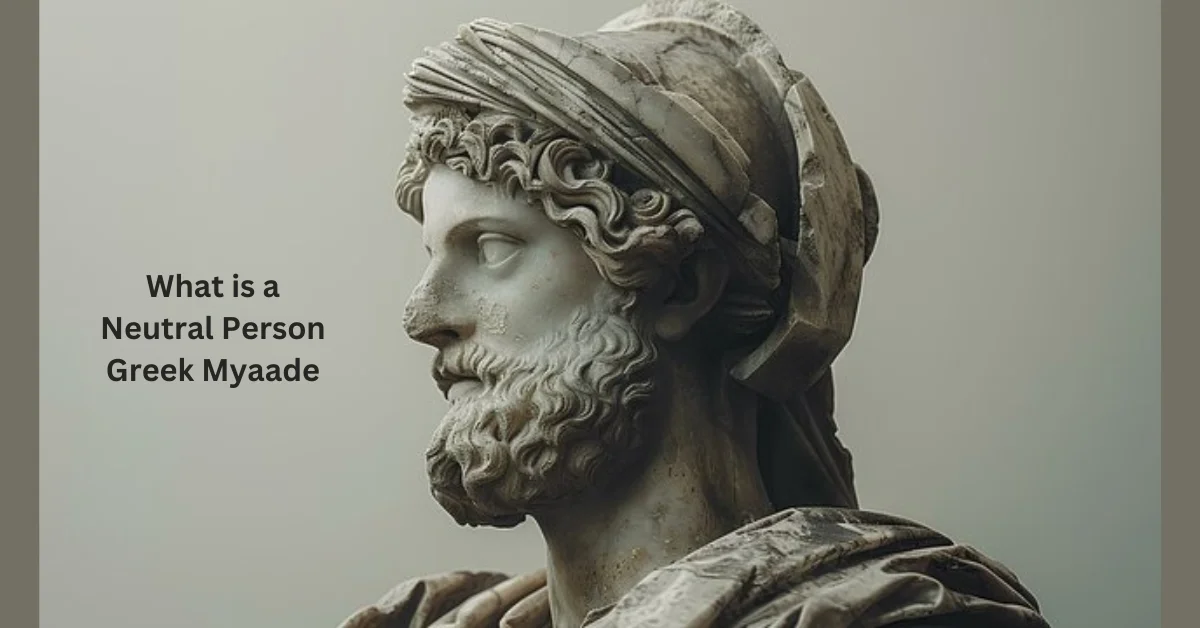What is a Neutral Person Greek Myaade? Exploring Balance and Impartiality
Neutrality has held various meanings across cultures, ideologies, and individual philosophies. In ancient Greek culture, where philosophical debates were prevalent, neutrality was often intertwined with ideas of balance, virtue, and the middle path. Today, when we inquire about what is a neutral person Greek myaade, we are delving into a multifaceted concept that ties ancient Greek thought with modern interpretations of neutrality in human behaviour and social interactions.
The Concept of Neutrality in Greek Philosophy
Greek philosophy has long been a foundation for discussing ethics, morality, and the human condition. Philosophers like Aristotle, Socrates, and Plato have all delved into the nature of virtues, ethical living, and the path to achieving a balanced and harmonious life. The idea of neutrality, or being neutral, is often intertwined with the pursuit of balance, fairness, and objectivity in decision-making.
What Does Myaade Mean?
The word Myaade is not a traditional Greek term found in ancient texts. However, it can be understood within contemporary philosophical interpretations of neutrality and balance, drawn from modern Greek philosophy or interpretations of classical Greek ideals. While Myaade might not be universally recognized, its roots likely lie in the Greek notion of “eudaimonia” (flourishing or well-being) and virtue ethics.
Neutrality in Modern Contexts
In contemporary society, understanding a neutral person Greek myaade involves applying these timeless principles to everyday life. Neutral individuals often serve as mediators, facilitators, and problem-solvers in personal, professional, and political realms. Their impartiality enables them to bridge divides, fostering understanding and collaboration.
For instance, core principle. In journalism neutral journalists report facts without injecting personal opinions, allowing readers to form their conclusions. Similarly, in diplomacy, neutral nations play a vital role in conflict resolution, offering unbiased negotiation platforms.
The Role of Balance in Greek Ethics
At the heart of Greek ethics is the concept of balance. Aristotle most famously explores this in his Nicomachean Ethics, where he introduces the idea of the “Golden Mean.” The Golden Mean is the principle that virtue lies between extremes. Being virtuous means avoiding excess and deficiency in any aspect of life. For example, courage lies between recklessness and cowardice, and generosity lies between wastefulness and stinginess.
Read Previous: Plaza de Godoy Cruz Theater Accident
The Psychological Aspect of Being Neutral
From a psychological perspective, being neutral or impartial has intriguing implications for mental health and personal well-being. What is a neutral person Greek myaade, in this sense, could be interpreted as someone who maintains emotional equilibrium, avoiding extremes in their emotional reactions. Such individuals are less likely to be affected by stress, anxiety, or anger, as they can detach themselves from highly charged situations and view them with clarity. Neutrality, however, does not imply indifference or a lack of emotion. Instead, it is about managing emotions to allow for rational decision-making and empathy. A neutral person in this context is someone who, even in the face of adversity, can remain composed and thoughtful, using logic and reasoning to navigate challenges.
Neutrality and Ethics in Modern Life
While the idea of neutrality in Greek philosophy is rooted in ancient traditions, it remains highly relevant in the modern world. In today’s complex and often polarized society, the ability to be a neutral person Greek Myaade, has never been more critical. With increasing division in politics, social issues, and personal relationships, impartiality and balance offer a pathway to greater understanding and cooperation.
The Importance of Neutrality in Leadership
The qualities of neutrality and impartiality are essential in leadership. A leader who embodies the essence of what it means to be a neutral person Greek Myaade, can make decisions based on reason, fairness, and the well-being of all, rather than out of personal bias or self-interest. In leadership roles, neutrality allows for trust-building, as followers feel that their concerns will be addressed and that decisions will be made without favoritism. This type of leadership can unite diverse groups and guide them toward a common goal. Whether in politics, business, or community organizations, leaders who embody neutrality help foster environments where fairness, respect, and cooperation are prioritized.
FAQs
What is a neutral person Greek Myaade?
A neutral person embodies balance, fairness, and impartiality, drawing from Greek philosophy’s emphasis on virtue and emotional equilibrium.
Does neutrality come from Greek philosophy?
Yes, Greek philosophers like Aristotle emphasized balance, with concepts like the Golden Mean aligning with neutrality.
What is “eudaimonia” in relation to neutrality?
“Eudaimonia” means flourishing through virtuous living, which includes maintaining emotional balance and rational decision-making.
How does neutrality affect leadership?
Neutrality helps leaders make unbiased decisions, fostering trust, fairness, and cooperation in their teams.
Conclusion
The concept of neutrality, as explored through the lens of Greek philosophy, emphasizes the importance of balance, fairness, and emotional equilibrium in both personal and societal contexts. While the term “Myaade” is not rooted in ancient Greek texts, it can be understood as a modern interpretation of the timeless Greek ideals of virtue and rational decision-making.
Read Next: Thetopics

